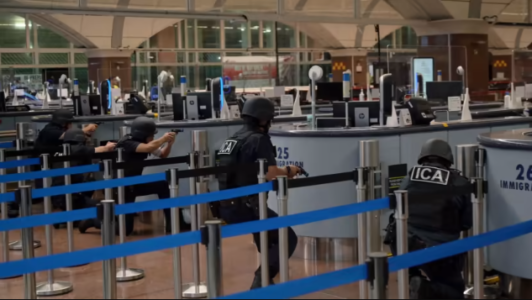A significant shift in security protocols at Tuas and Woodlands Checkpoints as ICA officers assume first responder duties from the police.
SINGAPORE: A typical weekday evening at Tuas Checkpoint unfolds calmly, with heavy vehicles arriving from Malaysia and travelers clearing immigration. Suddenly, chaos erupts as four gunmen clad in camouflage storm the arrival bus hall, forcing civilians to flee. Instead of Singapore Police Force (SPF) officers responding, Immigration and Checkpoints Authority (ICA) officers take the lead, returning fire and subduing the attackers swiftly, with support from SPF and the elite Gurkha contingent.
This scenario played out during a simulated ground deployment exercise, codenamed Genesis, held at Tuas Checkpoint on November 16. The exercise showcased the ICA’s transition to first responder status for security incidents at Woodlands and Tuas Checkpoints, effective January 3 next year.
With this change, SPF officers will no longer respond first to security incidents at these checkpoints. Over 300 ICA officers have undergone extensive training in tactical movement, interview techniques, and search protocols, ensuring they are well-prepared for their new responsibilities. ICA officers already respond to incidents at sea checkpoints, while SPF remains the first line of security at air checkpoints, including Changi Airport.
The exercise involved over 200 personnel from ICA, Singapore Civil Defence Force (SCDF), and the police, observed by Home Affairs and Law Minister K Shanmugam and other key officials.
Technological Advances
The ICA officers’ operations are bolstered by the integrated operations centres at the land checkpoints, operational since February. This system allows officers to access data from various sources through a single platform, enhancing situational awareness and response efficiency.
Live video feeds from first responders’ body-worn cameras and nearby CCTV cameras are displayed on large screens in the command room, enabling commanders to deploy the nearest officers swiftly. When a panic alarm is activated, the closest camera views automatically appear, alerting the command team to the situation, such as “Handling unattended baggage at departure bus hall.”
Previously reliant on voice communication for updates, ground commanders can now receive instant situational updates through text, images, and videos from officers’ mobile devices and cameras. The system’s advanced video analytics capabilities can flag anomalies—such as unattended bags or intrusions—allowing for quicker responses.
In another scenario during the exercise, a car stopped for a routine check became a sudden shootout as the driver opened fire on ICA officers. The officers engaged the shooters effectively, demonstrating their preparedness for real-life threats.
Evolving Role of ICA
Following amendments to the Immigration Act in April 2018, ICA officers gained the authority to intervene decisively during security incidents, conduct searches, and arrest suspicious individuals at the checkpoints without waiting for police assistance. Previously limited in their operational scope, ICA’s new role underscores a shift from merely handling immigration and cargo clearance duties to taking on protective security functions.
Mr. Chua Tuan Meng, ICA’s land domain commander, emphasized this transition as a crucial development in enhancing Singapore’s border security. He stated, “ICA will continue to train more officers in protective security functions and refine our capabilities to keep Singapore borders safe and secure.”
As ICA steps into this pivotal role, the agency aims to strengthen its operational readiness and ensure the safety of Singapore’s land checkpoints.








